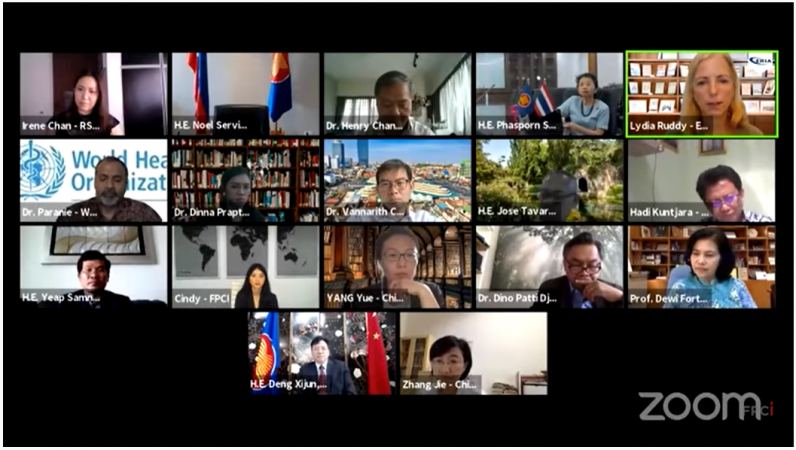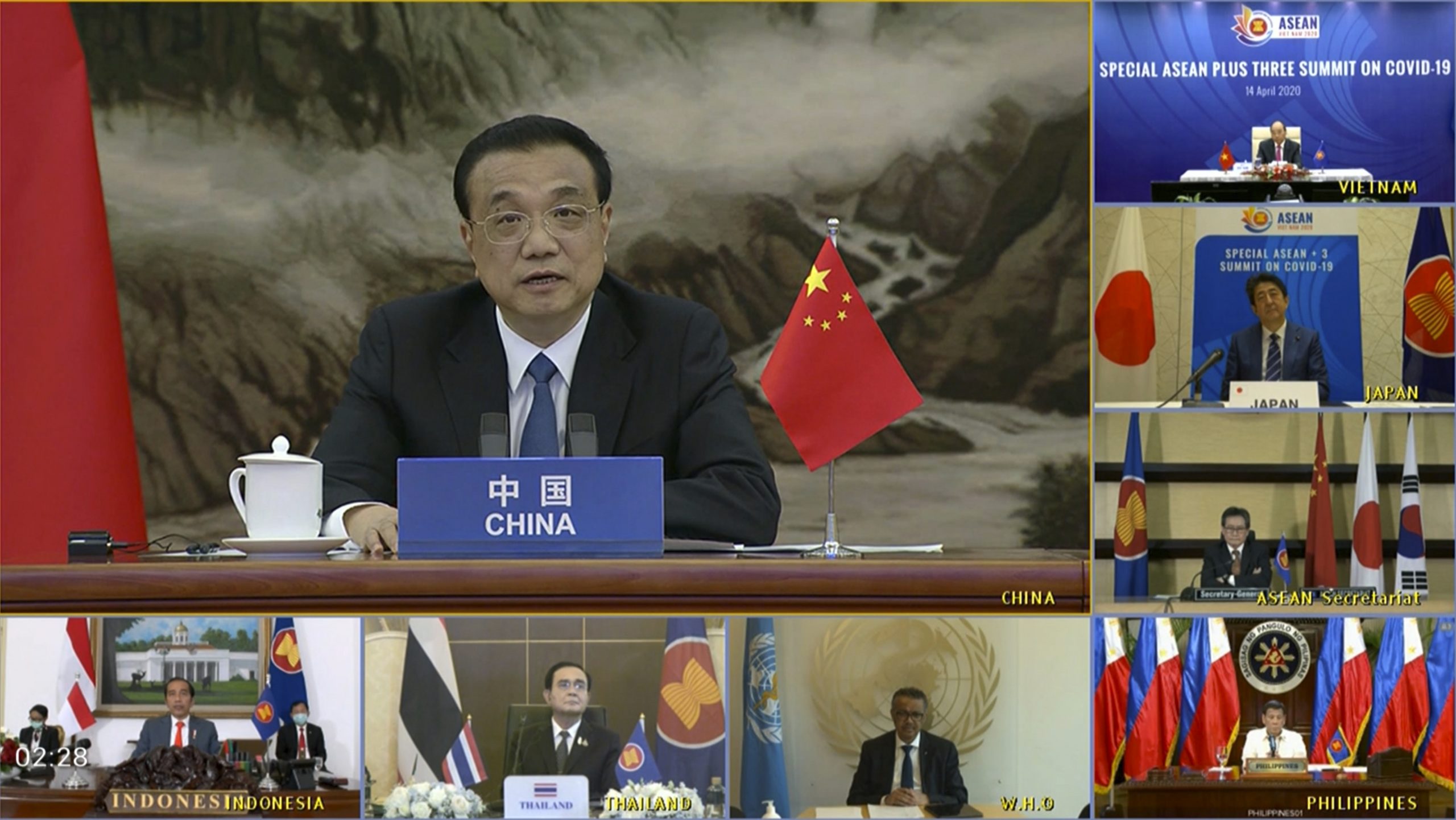Media Coverage from ERIA – 29 May, 2020
The Economic Research Institute for ASEAN and East Asia (ERIA) participated in the 1st Jakarta Forum on ASEAN-China Relations 2020 held online by the Foreign Policy Community of Indonesia (FPCI) on 29 May. The Forum aimed to promote the dynamic intellectual collaboration between relevant stakeholders in the ASEAN-China relationship. Hosted by the Mission of the People’s Republic of China to ASEAN and the Permanent Mission of the Philippines to ASEAN, the virtual forum covered the topic of ‘ASEAN-China Cooperation in dealing with the COVID-19 Pandemic.’

Several Permanent Representatives of ASEAN Member States (AMS) were in attendance including His Excellency (H.E.) Ambassador Ade Padmo Sarwono of Indonesia; H.E. Ambassador Noel Eugene Eusebio M. Servigon of the Philippines; H.E. Ambassador Yeap Samnang of Cambodia; Her Excellency Ambassador Kamsiah Kamaruddin of Malaysia; H.E. Ekkaphab Phanthavong of Lao PDR; H.E. Ambassador Aung Myo Myint of Myanmar; Her Excellency Ambassador Kok Li Peng of Singapore; Her Excellency Ambassador Phasporn Sangasubana of Thailand; Ms Noramali Jumatand, Charge d’Affairs Brunei Darussalam Mission to ASEAN; and Representatives of the Mission to ASEAN of Viet Nam. FPCI Co-Founder, Professor Dewi Fortuna Anwar moderated the virtual forum. ERIA was represented by Director of Communications, Ms Lydia Ruddy as a discussant.
The COVID-19 pandemic has caused havoc on global economies, communities, and healthcare systems since early 2020. Unlike previous disasters or crises, the COVID-19 pandemic required a different response whereby governments had to turn to their respective national resources to combat the outbreak. For ASEAN and its dialogue partners such as China, the pandemic became an opportunity to forge stronger cooperation such as information sharing, shipping of equipment and supplies as well as the exchange of best practices.
As H.E. Ambassador Noel Eugene Eusebio M. Servigon of the Philippines stated in his Opening Remarks, ‘As we all can attest, the Coronavirus pandemic has forced us to quickly innovate and interact in new ways. But while our medium is different today, the principles that guide ASEAN-China Dialogue Relations remain the same: Solidarity, Friendship, and Cooperation especially during difficult times.’
As part of the COVID-19 response, ASEAN governments had to close national economies, therefore disrupting what Professor Dewi Fortuna Anwar calls ‘the lifeline of globalization’; these encompass sectors in transportation, trade, tourism, and services. Speakers and discussants of the virtual forum hence stressed the need to continue engaging in regional and bilateral cooperation – like those conducted with China – to mitigate the spread of the virus while strengthening the economy.
Reaffirming ASEAN’s commitment in responding to the pandemic, Deputy Secretary-General for ASEAN Socio-Cultural Community, H.E. Ambassador Kung Phoak stated, ‘Guided by our leaders, ASEAN will tackle the challenges collectively to limit the loss of lives, productivity, and livelihoods, support post-pandemic recovery efforts especially in the most affected sector such as health and trade, and strengthen supply chain resilience against future shock. ASEAN looks forward to sustaining these objectives in collaboration with China and other external partners.’
Sharing his thoughts on the ASEAN-China response, Mission of the People’s Republic of China H.E. Ambassador Deng Xijun stated, ‘After the virus hit ASEAN, the Chinese central and local governments, the military, the business community and private entities responded with no delay to reciprocate acts of friendship and kindness from ASEAN. The urgently needed medical supplies have since been flowing uninterruptedly from China to ASEAN countries. Our mutual, timely assistance and support gave each other strength and confidence to fight.’
When it comes to the ASEAN-China response to the pandemic, ‘It is important to note that no one played the blame game. This is crucial in terms of building and maintaining trust – the key to any relations,’ expressed ERIA’s Ms Lydia Ruddy.
ASEAN-China cooperation in the health sectors stems beyond the provision of equipment and information sharing, it has also included research and development of a vaccine. Although it may take many months or more until a vaccine will be ready, ASEAN and China have taken the extra step of ensuring equitable access.
Ministry of Foreign Affairs of the Republic of Indonesia’s Director General of ASEAN Cooperation, H.E. Ambassador Jose Tavares voiced in his speech that ‘We [ASEAN] are exploring the possibility of joint production in medicine and vaccine when it is found.’ Indonesia, along with Malaysia, have additionally endorsed the WHO’s ‘Solidarity Call to Action’ which will ensure all therapeutics, diagnostics, and vaccines are global public goods making it more equitable for everyone.
H.E. Ambassador Deng also shared that “COVID-19 vaccine development in China, when available, will be a global public good and this will be China’s contribution to ensuring vaccine accessibility and affordability in developing countries.”
Since being declared a pandemic by the WHO on 11 March 2020, ASEAN and China have elevated their bilateral relations and have demonstrated the multi-sectoral benefits that mutual assistance can deliver during a crisis. By working closely to equip the regional organization with adequate equipment, support, and knowledge, ASEAN understands what necessary measures to take if the likelihood of a second or third wave of infection occurs. Essentially, it is hoped that AMS will be better equipped and prepared to face another onset of COVID-19 infections. The ASEAN-China response to the pandemic illustrates what Founder of FPCI, Dr Dino Patti Djalal mentioned in his Closing Remark in that ‘the COVID-19 crisis should and must make us closer because it affects not just ASEAN but the whole world.’





